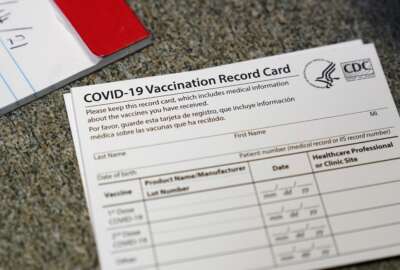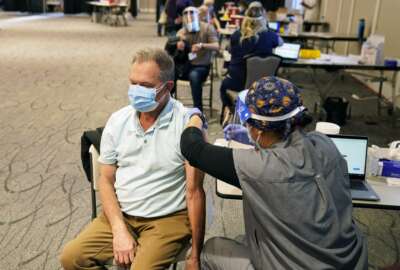
Growing numbers of service members getting COVID vaccine exemptions
Who should be exempted by their employers from a vaccine mandate? In the case of active duty military members, it's not so clear.
Best listening experience is on Chrome, Firefox or Safari. Subscribe to Federal Drive’s daily audio interviews on Apple Podcasts or PodcastOne.
It is one of the big questions of the day: Who should be exempted by their employers from a vaccine mandate? In the case of active duty military members, it’s not so clear, but lots of queries have been lighting up the phones of Sean Timmons. He is the managing partner of a law firm Tully Rinckey, and he spoke to Federal Drive with Tom Temin.
Interview transcript:
Sean Timmons: We’re getting questions from every branch of service. We’re getting them across the board, across the spectrum, on the lowest ranking individuals who just signed up to join the military all the way up to senior officers, senior commanders of the Army, the Navy, Air Force, Marine Corps, Coast Guard, federal employees – we’re getting it across the board. I will say that hesitation seems to be more significantly pronounced in the Army and Marine Corps. But I’ve got clients in each branch of service. And we also have 17 attorneys who work in our military practice group. We are the largest military practice group in the country, to my knowledge, and each of us have been working overtime, significant hours, weekends, nights, our calls have been nonstop since August.
Tom Temin: What are they asking for, for medical exemptions or religious exemptions? What is it they’re asking for?
Sean Timmons: It fits into about four different buckets. The first bucket I would say fits into is people with sincere religious objections, because they want an accommodation based on their religious practice, their moral belief that the vaccine is corrupted by the research, or the fetal cells that were used in the process of development.* A lot of people who claim to be pro life see the abortion research and saying that that prohibits their moral conscience from allowing them to have the vaccine. That’s one reoccurring theme. Now I say that’s the main theme, religious objection. However, we see a large number of people who say, I’ve got a medical problem, and I’m afraid the vaccine is not vetted properly. Therefore, I have a medical concern, I’m afraid my present position is going to be aggravated by taking this vaccines, I do not want to be vaccinated. That’s bucket number two. Bucket number three are people who are saying, “Look, I’m about to get out. My enlistment’s over in two weeks, do I really have to comply? Or I’m retiring in three months? Do I really need to comply, so like and administrative removal?” And then bucket number four is a large number of people saying “Hey, I already had COVID already recovered? Why should I have a vaccine? I’d rather have natural immunity.” Well, unfortunately, natural immunity is not really considered by the military an acceptable accommodation. So they’re not allowing it. But those are the four main themes. And honestly, bluntly, number five, I see a lot of conspiracy theories, not as common [with] federal employees and the military members. But we do see some reoccurring conspiracy theories throughout each of those elements. We try to walk people back from the conspiracy theories – you can’t use the conspiracy theory information as a basis to get an accommodation. So our focus is mainly the legal authorities.
Tom Temin: Sure, they probably cite that as evidence of the conspiracy itself.
Sean Timmons: Yes, that’s of course. They cite that, they also cite evidence the conspiracy that the military has prohibited uniformed attorneys in the military from helping soldiers seek an accommodation. So it’s like, wait, the system not even allowing me to use the attorneys in the military, they usually usually provide to soldiers to help you out? They’re not so as a civilian provider, we’re absolutely able to help anybody out. But if you go to legal assistance at Fort Hood, or if you go to trial defense services in Fort Bragg or any of the other installations, they’re going to say sorry, we’re prohibited from helping you out. Go hire a civilian.
Tom Temin: The religious exemption requests the one that is the most common, are you able to get those exemptions? What is the record so far across the armed services, I guess, in the civilian agencies too, for that matter? What are they doing about that?
Sean Timmons: So far, the only branch that I’ve seen significant number of religious commendations approved is the U.S. Army. The Navy and Marine Corps, they fall into the same department as the Navy and the Air Force they’re sitting on, they have not made a decision one way or the other. I have not seen an approved religious acommendation from the Air Force at this time. I also have not seen not denials either. So I really don’t know what they’re waiting on as far as decision-making process. But secretary of the Army has been pretty blunt and accommodating, I would say. I believe the Army feels it’s necessary because they’re going to lose 20%-30% of their force if they don’t grant significant number of accommodations. So the Army is approving them. I’ve seen some at Fort Hood. I’ve seen some other installations. I’ve also seen a couple of medical waivers across the Army saying look, this person in the medical evaluation process, we’re going to medically retire, they already have cancer, their immune-compromised, they don’t want to add something else into their debilitating cancer already. So we’re just gonna not make them get the vaccine. So I will commend the Army, they have been processing these. The other branches are sitting on ’em.
Tom Temin: We’re speaking with Sean Timmons, he’s managing partner of the law firm Tully Rinckey. And getting back to the exemption grounds, say religious, often in the case of a dispute between employer and employee or military and the leadership, you can cite case law. You can cite law itself. You can have chapter and verse that you can reference in defending a person or holding up their rights. Is there any case law or chapter and verse in the case of a vaccination exemption?
Sean Timmons: There is a statute that we’re providing to specifically the 1993 Religious Freedom Restoration Act provides a significant legal protection for those individuals who say they need to religious accommodation in their workplace. That law was in reaction to other Supreme Court cases that said, oh, well, the government has compelling interest therefore they can infringe on your religious liberty. The government can still infringe on your religious liberty if say you’re religious practices is something like cannibalism which causes human sacrifice. They can obviously say, mo, we’re not going to commit murder because even if it’s a religion. However, if it’s a routine religious practice, they generally have to provide an accommodation unless it meets the strict scrutiny standard. Government’s going to argue, well, vaccination needs strict scrutiny. Our response is no it doesn’t, not at this time, because the vaccine is still being vetted. And people have a religious right to decide how they conduct themselves when it comes to their own body.
Tom Temin: In other words, that law would protect, say, Muslims who have to stop and pray several times a day religious Jews also have certain periods of the day when they have to stop and pray. And so that type of accommodation is happening under that statute.
Sean Timmons: Yeah, same accommodation that happens where people who want to take holidays for like a Hindu temple – that’s not a normally recognized holiday amongst federal employees. But if that’s your religious practice and you’ve been following it and it is sincere, the government’s required to give you an accommodation and – maybe you can work a different day, but you’re allowed to take your holidays. We have people who have moral objections across the spectrum, whether they’re Nordic pagans to Buddhist, Muslims, fundamentalist Christians, or just regular mainline Orthodox Christian or Catholic, even though the Pope has said, vaccination’s fine. We have a lot of priests who are writing letters saying what my parishioner is opposed to this, therefore, grant them the accomodation, so.
Tom Temin: Yeah, well, the Pope says a lot of things nobody pays attention to, I guess. But getting back to the “sitting on it” idea that some of the leadership is exhibiting when you have contacted them. What does that mean for the individual? That means they’re neither reprimanded nor having to get the vaccine?
Sean Timmons: At this time? Yes, they are setting up what’s called a consolidated adjudication process for separation authority, meaning they’re going to funnel everybody who refuses to get the vaccine without an accommodation or an exemption into a discharge process. The Navy and Marine Corps just issued guidance that everybody who does not get an accommodation or waiver will be discharged with no worse than a general discharge. And they’ll be discharged pretty quickly, probably early next year. So it’s imperative that individuals who have an objection who have not complied with the directive to get the vaccine don’t file the written request for a waiver or accommodation. Otherwise, they will be discharged. And each branch is setting up consolidations boards that make this very efficient. Now the Army has granted reserves and guard all the way until June of next year. I believe the reason for that is they hope the pandemic’s over by then so they can then withdraw the mandate. But the other branches are pretty sincere about removing individuals that don’t comply with the vaccine mandate.
Tom Temin: And I wanted to ask also about the idea of someone being within days or a couple of weeks of their enlistment being over or the retirement occurring. Can they get away with that? Can the supervising officers or civilians if the case might be just look away, and just let it slip?
Sean Timmons: I’m seeing that happen. I’m seeing people just file their terminal leave, and go on leave, clear the installation and ride off into the sunset. We have had success with that. I don’t know if that’s going to continue indefinitely. But at the current moment, they’re not putting a lot of resistance on those who have completed their career. It would be very difficult to divest somebody of their retirement eligibility at 19 years and 10 months. I mean, unless they commit a serious felony, they’re probably going to get their retirement. That’s just the reality of it. So generally, if you’re near retirement, you can ride to clock out, if you’re near [Expiration – Term of Service ] date, they really don’t want to hold somebody beyond their ETS date just to prosecute them for not complying with the vaccine mandate. Now, if they engage in other misconduct, they very well could but just the vaccine, they’re not spending a lot of resources on it. Don’t forget the military justice shops are required to handle these issues. And they’re also dealing with the standard day-to-day stuff and DUIs, sexual assaults – everything else that the military deals with. So it’s really causing a significant manpower issue with legal offices across installations.
Tom Temin: So the main concern then for someone enlisted running out the clock is they still want to get an honorable discharge?
Sean Timmons: Yes, they want to make sure that your discharge is vested … honorable. If they don’t have an approved combination or waiver though, and they’re not out to say before the end of the year, they probably need to seek it immediately. Otherwise, they face getting a general discharge, which would cause them to lose significant benefits such as the GI Bill, the post-9/11 GI Bill, mortgage interest rate reduction from the VA, home loan benefit guarantees. I mean, you will still get some benefits to the general discharge, but you lose a significant number of them. The gold standard is honorable discharge.
Tom Temin: Sure. And finally, you have seen instances of people at a lower level taking responsibility for this decision when it really should be higher ranking. Tell us about some of those cases. And what should be the protocol for who decides in a given regiment or unit?
Sean Timmons: Yes, unfortunately, we’re seeing a lot of company commander level, [CPT] 03-, 04-, 05-level commands, putting your subordinates under duress, basically putting them on a bus and making them go to the gym and basically ordering to take the vaccine. If they filed an accommodation or a written request, then we’re getting called literally while they’re in line saying I’m being ordered to take the vaccine right now. Do I have to do it? Like no, you just told them you have an attorney and you’ve filed a request for an accommodation and hasn’t been ruled upon. So get out of line. Don’t make them stick the needle in your arm. So we’re seeing those kinds of activities from lower levels, and I think it’s because they’re under duress, meaning that the generals, the admirals, are telling your subordinates “Hey, any unit that has 100% compliance, we’re going to give them a stellar evaluation and promotion. So get to 100 compliance with your unit.” And individuals who have low level compliance are being basically ostracized and harassed by their senior leadership.
Tom Temin: Wow! And finally, what about on the civilian side of government? You said, you’re getting calls from civil agency employees. And what is the general tone and disposition of cases there?
Sean Timmons: Well, for private employers, they’re making accommodations. Like, for example, I got a notice from client of mine working at a major financial institution in New York and with offices across the country. And they actually, even though they’re a federal contract or they’re pushing back, kind of like Southwest Airlines, I don’t want to give away the name of the employer because of the confidential nature of the representation. But we are seeing employers push back against the mandate in the federal government to say we’re not going to make it a condition of employment, we don’t believe we should force our employees to make a medical decision. However, the federal government, under the president’s executive authority, they are really pushing hard. And unfortunately, a lot of those individuals may well lose their job unless they get an approved religious accommodation or medical waiver. And it’s a little bit easier for the government to terminate employment than it is to say, prosecute somebody in the military for failure to follow a lawful order. In the military system you’re talking about a criminal sanction for failure to follow legal orders. In the federal government. If you don’t do what your supervisor tells you to do, all they can do is fire you. So losing your job is not necessarily the same repercussions. So federal employees are kind of in a difficult position, significantly so. The legal protections are less than those in the military. They still should seek a religious accommodation, they should still seek a medical waiver if they feel that they should not be compelled to be vaccinated, however, ultimately, the worst that can happen to them is they lose their job.
Editor’s note: The COVID-19 vaccine does not contain, but was developed using fetal cell lines, which are cloned copies of cells from the same source that have been adapted to grow continuously in labs. The cell lines used for the COVID-19 vaccine were originally generated from the cells of a couple of aborted fetuses from the 1970s and 1980s.
Copyright © 2024 Federal News Network. All rights reserved. This website is not intended for users located within the European Economic Area.
Tom Temin is host of the Federal Drive and has been providing insight on federal technology and management issues for more than 30 years.
Follow @tteminWFED






